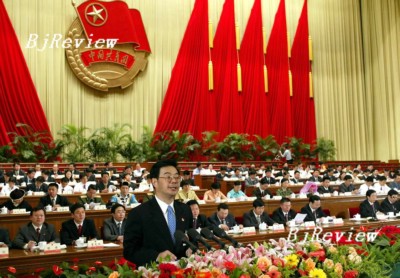
At the end of last year 43-year-old Hu Chunhua was appointed head of the Communist Youth League of China. At less than 50 years of age Hu represented a group of rising political stars who belong to a younger generation.
The emergence of this crop of younger political figures has not been by accident. Prior to a reshuffle of provincial leaders at the end of last year, the Central Government instructed to include at least three appointments under 50 years old and one around 45. That move created an opportunity for ambitious younger political figures to enter high government positions.
"It shows the determination and capability of the present Central Government to add vitality to the top leadership," said Zhang Xiaoyan, an associate professor at the Party School of the Central Committee of the Communist Party of China (CPC). Such specific moves to bring younger faces into the higher levels of government have been rare, Zhang added, but they are increasing.
Younger generation
Hu, born into a peasant family, was the first person from his county to enroll into the prestigious Peking University in 1979, majoring in Chinese. As the youngest student in his class, he showed great academic talent during his four years of study at the university.
Hu came to public attention for the first time in 1983 when he graduated with honors and turned down opportunities to work in Beijing in preference to a position in Tibet.
Hu went on to work for the next 20 years across Tibet, rising from a regular government employee to a senior leader of Tibet Autonomous Region.
Described by his peers as energetic and vigorous, Zhou Qiang, 47, is currently the youngest provincial governor in China.
After Zhou took the post last October, his first act was to pay homage to Mao Zedong, founder of the People's Republic of China. He went on to make a name for himself for fighting corruption, exposing several corrupt officials in Hunan Province, and ordering more open law enforcement.
In 1999, Li Keqiang became China's youngest provincial governor when he was elected as acting governor of Henan Province at the age of 45. Li was also the country's first governor who holds a doctor's degree.
He had worked for the Communist Youth League of Peking University since graduating from law school in 1982. In 1998, he was transferred to Henan Province, a region where economic development had lagged behind much of China. Li was dispatched to Henan with the role of improving the province's economy, and he lived up to the position's demands. The per-capita GDP of Henan was 4,976 yuan when Li assumed power, ranking it 21st among the country's 31 provinces, autonomous regions and municipalities. After fours years under Li, in 2003, the province's per-capita GDP had risen to 7,590 and its ranking had climbed to 18th.
Li also did much to help people with AIDS in the province, assigning extra help for people with the virus and visiting three villages struck by it himself.
As well as being popular in Henan for this, his stand against corruption, and the economic improvements he brought, Li was also known as a likeable province leader. "He is an official much more like a scholar, who wears typical gentle smiles," said one government official from Henan.
| 